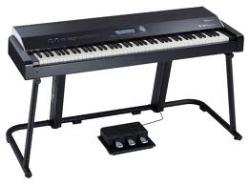
Electronic keyboards have a wide range of uses. They are portable, they can be hooked up, via an industry-standard MIDI (musical instrument digital interface) to a computer for composition, recording, and signal-processing. They can synthesize sounds, and have lots of bells and whistles. Some even come with learning software that includes graded lessons. Prices for keyboards range from $200 to about $3,700 for one that’s top of the line.
What's right for you or your beginning student? Forget about all the extra technology to begin with, because even the simplest models have amazingly cool capabilities. Concentrate on the instrument's size/ complexity and the mechanics of the actual keyboard.
Keyboards, unlike pianos, do not have a standard number of keys. The larger models, of course, have 88 keys, just like the piano, but smaller models have anything from 76 down to 25 keys. Most serious players need all 88 keys, but you can get away with 76, especially with high-quality boards (like the Kurzweil, Yamaha, Roland or Korg). You can still have a high number of synthesized presets and the pricey ones also give you faders and other stuff that are turn-ons for serious electronica fans. Most musicians would say that a 61-key keyboard is good as a second, more portable keyboard, which will take up less space in a setup or music studio. But it's really not the best option as your main instrument, even for beginners.
No matter what keyboard you are considering, test it. It needs to have even key action, and you probably want some “spring” or resistance. That way it's easier to go back and forth between a piano and a keyboard. In electronics terms, you are asking for “weighted keys.” You also need “touch/ velocity sensitivity” so that you have the same volume control on the keyboard as on a piano. Some users prefer “synth action,” however, the un-weighted option, which is better for people who play other instruments but want to use a keyboard for composition or music copying or synthesizing, etc.
Electronic keyboards are much less standardized than their piano cousins, so there are a wide range of technical considerations that could come into play for advanced and professional musicians. But you don't have to go there for a while. Concentrate on getting a keyboard that feels good underneath your hand, and sounds good.

